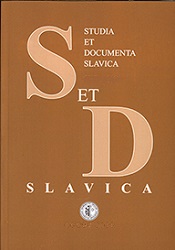WOMAN AS A MATE AND COMRADE OF MAN IN H. G. WELLS'S “THE NEW MACHIAVELLI”
WOMAN AS A MATE AND COMRADE OF MAN IN H. G. WELLS'S “THE NEW MACHIAVELLI”
Author(s): Brygida PudełkoSubject(s): Social history, Gender history, Novel, Pre-WW I & WW I (1900 -1919), British Literature
Published by: Uniwersytet Opolski
Keywords: H. G. Wells; women's emancipation; sexuality; free love; marriage;
Summary/Abstract: H. G. Wells's The New Machiavelli (1911) was the bold statement of the rights of women in the new century. It was, of course, useless to deny that The New Machiavelli had a sexual base. The sexual relations between men and women had come to dominate Wells's mind, and it was going to be an important topic in his books. Wells's novel, which is a cry of anger against the oppressive conventions of society, is in part based on autobiographical detail of Wells's own life, his affair in 1908 with Amber Reeves, a brilliant Cambridge graduate. Central to Wells's doctrines of male-female relationships is his understanding of the duality of love. Wells stresses the importance of two people loving each other at the level of the mind as well as the body. Work is considered by Wells as important as sexual relationship. In both cases the dual nature of love, that is fulfillment both physically and spiritually, is deemed necessary for a true and satisfactory relationship. In his feminist texts Wells distinguishes clearly between male ideals of marriage and womanhood, and emancipated female characters who are aware of what they are doing, but consider it their right and privilege to lead the kind of life they wish to, and are prepared t.o take the consequences.
Journal: Studia et Documenta Slavica
- Issue Year: 8/2019
- Issue No: 2
- Page Range: 33-44
- Page Count: 12
- Language: English

